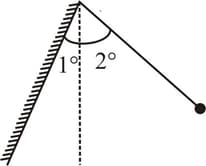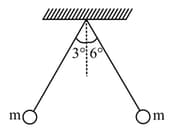Exercise 1
Embibe Experts Physics Solutions for Exercise 1
Simple step-by-step solutions to Exercise 1 questions of Oscillations from Physics Crash Course JEE Advanced. Also get 3D topic explainers, cheat sheets, and unlimited doubts solving on EMBIBE.
Questions from Exercise 1 with Hints & Solutions
A particle executes linear simple harmonic motion with an amplitude of When the particle is at from the mean position, the magnitude of its velocity is equal to that of its acceleration. Then its time period in seconds is
In , graph of which of the following is a straight line?
Assertion: Total energy of a particle executing is maximum at mean position.
Reason: The velocity of the particle executing is maximum at mean position.
The total energy of a particle executing simple harmonic motion is proportional to the
The length of a simple pendulum is increased by . The percentage change in its time period is
A simple pendulum of length is displaced by an angle from its mean position and released from rest. It collides elastically with a wall which is inclined at an angle of with vertical on other side of mean. Its time period (in sec) of motion is , what is the value of ? (Take: )

Two blocks of mass are connected to each other with springs in natural length on a smooth ground as shown in figure. An impulse is provided to both blocks in outward direction. The minimum time (in sec) after which the springs are in their maximum elongation position is , what is the value of ?

Two simple pendulum made of small masses m each are pulled to side as shown and released. The collision is elastic. If the time (in sec) from the release will the left mass first reach point from where it was released is , what is the value of ? Length of both strings is , take .

